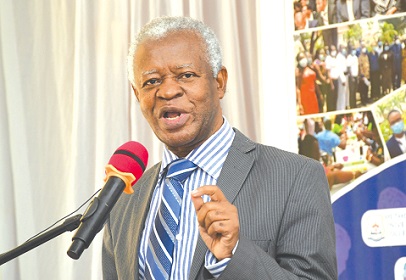
Change narrative about mental health - Prof. Osei urges psychologists
The Chief Executive Officer (CEO) of the Mental Health Authority, Professor Akwasi Osei, has urged psychologists to change the narrative on mental health in order for people to see its relevance.
He said even though the country was currently doing well with regard to understanding mental health issues, more needed to be done for people to know that there was a mental health aspect to everything that occurred in society.
“We are doing quiet well now,” he said, adding that “in the past, when anything goes wrong in the country or society, such as murder, the immediate reaction is whether there is any juju connection, witchcraft, ritual or demons associated with the incident but now those same people will ask what the mental health connections to the incident are, and that is very important.”
Prof. Osei said this at the Sixth Biennial International Research Conference of the Ghana Psychological Association in Accra last Thursday.
The two-day conference, which was on the theme: “Scaling up psychology and its practice in the post-pandemic future,” brought together seasoned and practising psychologists from Ghana and abroad including the President of the Pan-African Psychology Union, Prof. Saths Cooper, and Prof. Christopher Charles Mate-Kole of the University of Ghana.
Advertisement
Society
Prof. Osei stressed the importance of psychologists going into society to tell the story of mental health so that people would know exactly what was happening and dispel the misconceptions they had about the condition.
He pointed out that not telling the stories had been one of the issues associated with mental health in the country and said he was happy that the association was at the forefront of embarking on research on mental health and its connection to various issues occurring in the country.
“Now mental health has come out of the dungeons into the public and the misconceptions people have about it are gone. Our forefathers, the early psychologists, went to the extent of proving that it is not true that depression does not exist in Africa.

They underwent what I call demysticism. They demystified psychiatry and mental health at the macro level. You and I have to go further down to the micro level to dispel the myths people have about mental health,” he said.
Prof. Osei, who is a former Chief Psychiatrist of the Ghana Health Service, said mental health and psychology were part of the everyday life of people and asked that they should be given the needed attention.
Meaningful psychology
In his keynote address, Prof. Cooper urged psychologists to contribute meaningfully to a psychology that was relevant, truly universal and could serve all humanity.
“If people do not have the need for psychology, psychology will die,” he said.
Dynamics
In a presentation, Prof. Mate-Kole called for a change of dynamics in the teaching of psychology in schools, explaining that African cultural values needed to be introduced into it.
“If we do not do that, psychology will run into a genocide,” he stated.
The Deputy Registrar of the Ghana Psychology Council, Anna Plange, disclosed that the council would soon liaise with the security agencies to help deal with people who did not have the licence to practise, yet went round parading themselves as psychologists.
She disclosed that the council recently closed down the offices of some of these unlicensed psychologists.
